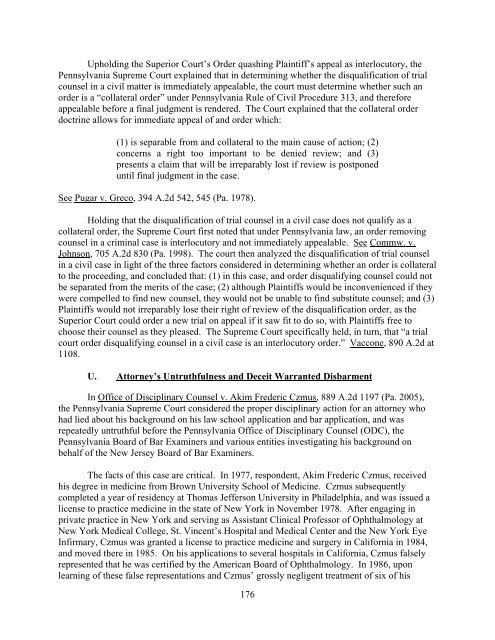2012 PROFESSIONAL LIABILITY UPDATE - Eckert Seamans
2012 PROFESSIONAL LIABILITY UPDATE - Eckert Seamans
2012 PROFESSIONAL LIABILITY UPDATE - Eckert Seamans
Create successful ePaper yourself
Turn your PDF publications into a flip-book with our unique Google optimized e-Paper software.
Upholding the Superior Court’s Order quashing Plaintiff’s appeal as interlocutory, thePennsylvania Supreme Court explained that in determining whether the disqualification of trialcounsel in a civil matter is immediately appealable, the court must determine whether such anorder is a “collateral order” under Pennsylvania Rule of Civil Procedure 313, and thereforeappealable before a final judgment is rendered. The Court explained that the collateral orderdoctrine allows for immediate appeal of and order which:(1) is separable from and collateral to the main cause of action; (2)concerns a right too important to be denied review; and (3)presents a claim that will be irreparably lost if review is postponeduntil final judgment in the case.See Pugar v. Greco, 394 A.2d 542, 545 (Pa. 1978).Holding that the disqualification of trial counsel in a civil case does not qualify as acollateral order, the Supreme Court first noted that under Pennsylvania law, an order removingcounsel in a criminal case is interlocutory and not immediately appealable. See Commw. v.Johnson, 705 A.2d 830 (Pa. 1998). The court then analyzed the disqualification of trial counselin a civil case in light of the three factors considered in determining whether an order is collateralto the proceeding, and concluded that: (1) in this case, and order disqualifying counsel could notbe separated from the merits of the case; (2) although Plaintiffs would be inconvenienced if theywere compelled to find new counsel, they would not be unable to find substitute counsel; and (3)Plaintiffs would not irreparably lose their right of review of the disqualification order, as theSuperior Court could order a new trial on appeal if it saw fit to do so, with Plaintiffs free tochoose their counsel as they pleased. The Supreme Court specifically held, in turn, that “a trialcourt order disqualifying counsel in a civil case is an interlocutory order.” Vaccone, 890 A.2d at1108.U. Attorney’s Untruthfulness and Deceit Warranted DisbarmentIn Office of Disciplinary Counsel v. Akim Frederic Czmus, 889 A.2d 1197 (Pa. 2005),the Pennsylvania Supreme Court considered the proper disciplinary action for an attorney whohad lied about his background on his law school application and bar application, and wasrepeatedly untruthful before the Pennsylvania Office of Disciplinary Counsel (ODC), thePennsylvania Board of Bar Examiners and various entities investigating his background onbehalf of the New Jersey Board of Bar Examiners.The facts of this case are critical. In 1977, respondent, Akim Frederic Czmus, receivedhis degree in medicine from Brown University School of Medicine. Czmus subsequentlycompleted a year of residency at Thomas Jefferson University in Philadelphia, and was issued alicense to practice medicine in the state of New York in November 1978. After engaging inprivate practice in New York and serving as Assistant Clinical Professor of Ophthalmology atNew York Medical College, St. Vincent’s Hospital and Medical Center and the New York EyeInfirmary, Czmus was granted a license to practice medicine and surgery in California in 1984,and moved there in 1985. On his applications to several hospitals in California, Czmus falselyrepresented that he was certified by the American Board of Ophthalmology. In 1986, uponlearning of these false representations and Czmus’ grossly negligent treatment of six of his176









